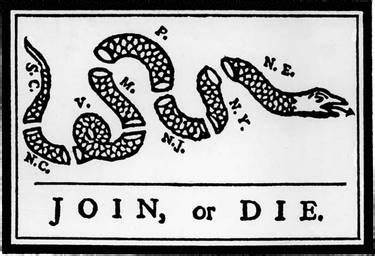Unit 3 Portable Flashcards (UNFINISHED)
1/21
Earn XP
Description and Tags
Name | Mastery | Learn | Test | Matching | Spaced |
|---|
No study sessions yet.
22 Terms
The French and Indian war
A war between the British and the French within the Ohio River Valley that involved Native Americans siding with the French against British colonists, the war ended in a British victory and territorial gain.
Albany Plan of Union
Taking place in Albany, NY; colonial representatives and Benjamin Franklin attempted to establish a unification of the 13 colonies economically and politically along with the Iroquois, they would however remain neutral and the colonies at first refused to unite.

Join or Die
A cartoon made by Benjamin Franklin establishing the icon of the early 13 colonies made to encourage them to unify, this would however not happen as a result of the colonies fearing the loss of their autonomy through uniting.
Treaty of Paris
The agreement that established the end of the F&I war between the British and the French signed in 1763 granting Britain all control of Canada, Spanish Florida, and the territories west of the Mississippi river.
Revenue Act of 1762
An act in which British stationed troops forced American colonists to pay taxes and other fees on imported/exported goods as a means to generate revenue to pay up for the F&I war’s costs.
Royal Proclamation Line of 1763
A line created by King George III which would ban colonial expansion beyond the Appalachian Mountains because King George III wished to maintain better terms with Native Americans though this would anger the colonists.
Currency Act of 1764
An act in which George Grenville banned paper money in the colonies to force them to use gold and silver to stabilize the British economy.
The Sugar Act
The raising of prices on farmed goods, primarily sugar to pay for the F&I war, also lead to the slogan “NO TAXATION WITHOUT REPRESENTATION.”
The Stamp Act
The act which placed taxes on paper goods such as newspapers.
The Quartering Act
An act established by the British in which colonists had to feed and provide shelter to British troops.
Sons of Liberty
An organization of male colonial protesters who organized to criticize English tax policies through means of boycotts and eventual clashes. They were catalysts to the eventual American Revolution.
The Stamp Act Congress
A meeting of nine colonies to coordinate actions against the Stamp Act.
Daughters of Liberty
Women who took part in the boycott of British goods by spinning home woven clothes and made other goods to support the economy of the Thirteen colonies.
Declaratory Act
An act in which the British stated that the colonies had the “virtual representation” and were not exempt from getting taxed.
Townshend Acts
A list of acts which placed taxes on paper goods, tea, paint, and lead.
Boston Massacre
Preceding this event, Samuel Adams would organize resistance in Massachusetts against taxation by the British. In 1770, overwhelmed British troops would fire upon the crowd of organized protesters which resulted in the deaths of 5 colonists, one being a former slave named Crispus Attackus.
Patrick Henry
A Virginian lawyer and politician who spoke against the Stamp Act with his speech in which he stated, “Give me liberty or give me death!”
Letters from a farmer in Pennsylvania
A series of letters written by John Dickinson which argued that parliament had no authority over internal colonial issues.
Tea Act of 1773
An act passed by the Parliament that helped the British East India Company the right to sell tea to the colonies at a reduced tax which would hurt local merchants.
Boston Tea Party
Set up by the Sons of Liberty, this act involved colonials dressing up as Indians and throwing British crates of tea into the ocean in protest to the Tea Act of 1773.
Intolerable Acts
A series of acts which included the Port Bill and Quartering Act which was in retaliation for the events of the Boston Tea Party.
First Continental Congress
A meeting in Philadelphia to estaqblish a common goal in the colonies. Congress sent a Declaration of Rights and Grievances to King George III, asserting their rights and demanding the repeal of oppressive legislation.